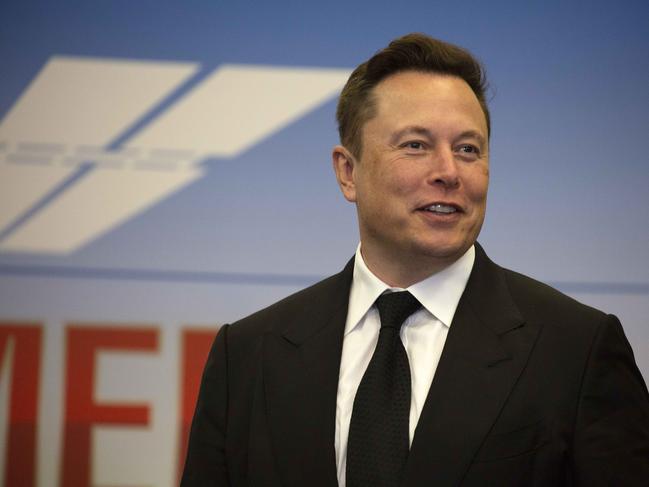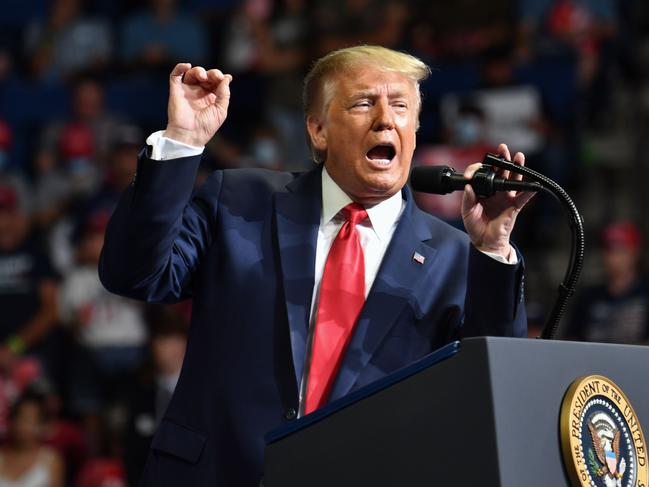TikTok users ‘prank’ Trump rally
The social media users say they are responsible for sending fake registrations to the US President’s Tulsa rally over the weekend.

Welcome to The Download, The Australian’s new technology blog for the latest breaking tech news. Today, the government says it will stick with its current COVIDSafe coronavirus app, Monash University and IBM have developed an e-bike that reads a cyclist’s brain, and new statistic show just how much Australians are prepared to spend on streaming services.
David Swan 4.00pm: Musk sets investor day and ‘battery day’
Tesla Chief Executive Officer Elon Musk said on Sunday that September 15 is the tentative date for the company’s shareholder meeting and its “Battery Day” at which it is expected to reveal significant advances in battery technology.
The battery event, which Musk has touted as being “one of the most of exciting days in Tesla’s history”, had previously been scheduled in May while the shareholder meeting was due to take place on July 7. Both were postponed due to the coronavirus pandemic.

The Battery Day event will include a tour of the company’s cell production system, Musk tweeted, without elaborating.
Two proxy advisors have urged Tesla investors to vote against re-electing Australian businesswoman and Tesla chairwoman Robyn Denholm to the company’s board, citing corporate governance and other concerns.
Chris Griffith 3.35pm: Review: Arlo Pro 3 Floodlight camera shines a light on dark places
For several years Arlo has provided a credible do-it-yourself domestic camera security system. I review the Arlo Pro 3 Floodlight camera which adds an almost blinding floodlight to their security arsenal.
The floodlight is battery-operated and activates when the Pro 3 camera detects motion in away mode. You get 2000 lumens when the unit is battery operated, and 3000 lumens when connected to power.
The other device is the Arlo Video Doorbell.
You get a 180 degree field of view through the 1536 x 1536 resolution doorbell camera, so you can see delivered packages around you. The camera can detect and inform you of packages, people, animals and vehicles. It has 12x digital zoom and supports high dynamic range.
Chris Griffith 3.20pm: Adobe targets working at home
Adobe has released a major upgrade to its Creative Cloud suite that takes into account people working from home due to coronavirus.
Adobe’s Scott Belsky says coronavirus has seen Adobe focus on collaboration – the ability of users at different locations to work on the same Adobe project at the same time. The changes will allow graphic artists, photographers and other creatives to work together on the same document simultaneously. This collaboration is being rolled out in a host of Adobe programs.
Additionally, Adobe’s all-in-one video tool Premiere Rush can output video in different formats that fit the requirements of individual social networking sites.
A new ‘auto reframe’ feature will keep the subject in frame when the dimensions of video change - even when auto reframe revamps video from portrait to landscape and visa versa.
David Swan 3.05pm: Listen to ‘Forward Slash’
The Australian’s new technology podcast, Forward Slash, is out now.
Episode one looks at the race to find a vaccine for COVID-19, and how science might be changed more permanently as a result.
David Swan1.30pm: Last week’s cyber attack the mark of a new ‘Cold War’
The official narrative of last week’s cyber assault is that our gallant cyberwarriors and CIOs saw off our Chinese foes – who were looking for the giant “off switch” for the Australian economy.
But it would be extremely naive to assume that the cyberattacks on the nation’s businesses and governments failed, writes former Deputy Director of US Naval Intelligence and the CEO and founder of ASX-listed cyber security firm WhiteHawk Terry Roberts.
“There are two probabilities that should never be discounted – one is to gain root control of a network, and/or to conduct long-term reconnaissance on their targets’ architectures, operations, communications and data.”
12.25pm: Musk postpones Tesla shareholder meeting
Elon Musk tweeted late on Friday that Tesla Inc will have to postpone its annual shareholder meeting as no large gatherings are allowed by July 7.
“Not sure of new date, but am guessing maybe a month or so later,” he added.
The company’s annual shareholder meeting was scheduled for July 7.
Yes, but we will have to postpone annual shareholder meeting, as still no large gatherings allowed by July 7th. Not sure of new date, but am guessing maybe a month or so later.
— Elon Musk (@elonmusk) June 20, 2020
Reuters
David Swan 10.20am: TikTok users ‘prank’ Trump rally
US President Donald Trump’s rally was semingly pranked by TikTok users and K-pop fans over the weekend, who say they registered massive amounts of free tickets in the lead-up to the rally in order to leave the event less than half empty.
Around 6,500 people are estimated to have attended the rally in Tulsa, despite the auditorium fitting 19,000 people.
Many TikTok users and K-pop fans posted videos ahead of the event encouraging others to register for the rally, then not attend.
“That arena is not full. The outside: empty. They couldn’t even get 19,000 people there and they had bragged that there was going to be a million,” Joy Reid reported on MSNBC.
“[Trump’s campaign manager Brad Parscale] was played by young people and K-pop fans who ordered tickets with no intention of going.”

Parscale said on Twitter “radical protestors” had “blocked access to the metal detectors, preventing people from entering.”
Representative Alexandria Ocasio-Cortez responded to Parscale, writing, “Actually you just got ROCKED by teens on TikTok who flooded the Trump campaign w/ fake ticket reservations & tricked you into believing a million people wanted your white supremacist open mic enough to pack an arena during COVID.”
This is what happened tonight. I’m dead serious when I say this. The teens of America have struck a savage blow against @realDonaldTrump. All across America teens ordered tickets to this event. The fools on the campaign bragged about a million tickets. lol. @ProjectLincoln.
— Steve Schmidt (@SteveSchmidtSES) June 20, 2020
Actually you just got ROCKED by teens on TikTok who flooded the Trump campaign w/ fake ticket reservations & tricked you into believing a million people wanted your white supremacist open mic enough to pack an arena during COVID
— Alexandria Ocasio-Cortez (@AOC) June 21, 2020
Shout out to Zoomers. Y’all make me so proud. â˜ºï¸ https://t.co/jGrp5bSZ9T
Social media users who’ve followed recent events might not be surprised by the way young people (and some older ones too) mobilised to troll the president.
They did it not just on China-owned TikTok but on Twitter, Instagram and even Facebook. K-pop fans — who have a massive, coordinated online community— have become an unexpected ally to American Black Lives Matter protesters.
In recent weeks, they’ve been re-purposing their usual platforms and hashtags from boosting their favourite stars to backing the Black Lives Matter movement.
They flooded right-wing hashtags such as “white lives matter“and police apps with short video clips and memes of their K-pop stars.
Additional reporting: AP
9.15am: Altium warns of FY revenue miss
Altium has warned its full-year result will miss market expectations after fresh lockdowns in Beijing and a rise in US coronavirus infections crimped already below-par sales.

The circuit board software company on Monday said revenue for the 12 months to June 30 would rise by a solid amount, but fall short of consensus predictions by analysts.
Citi this month forecast US$193 million in revenue, which it said was in line with market consensus.
Altium last month warned it was unlikely to hit an aspirational fiscal 2020 target of US$200 million because customers were preserving cash. On Monday, the company said its sales run-rate was falling behind analyst consensus before the Beijing lockdown and increased infection rates in the US.
Altium said it had closed its Beijing office and staff were closing sales remotely. Historically, Altium closes a significant amount of business in the last two weeks of June.
“Our strategy to support our customers and to increase volume under Covid-19 conditions through attractive pricing and extended payment terms is driving strong seat growth and will get us close to or just surpass our key target of 50,000 subscribers,” Chief Executive Aram Mirkazemi said in a filing to the Australian Securities Exchange.
“However, we are feeling the revenue impact of this strategy.”
Dow Jones
Chris Griffith 8.45am: Government sticks with its COVIDSafe app
The Australian Government appears set to stick with its in-house developed COVIDSafe app despite moves by Britain to ditch its app in favour of one developed by Google and Apple.
A historic agreement between Google and Apple – normally two rivals – has seen them build a platform that makes it easier for countries to develop apps that aid contact tracing. The Apple and Google built in contact tracing system offers better privacy than the COVIDSafe app and integrates with their smartphone operating systems, but Australia is not going down that path despite Britain’s change of mind.
Last week UK Health Secretary Matt Hancock said the UK government was abandoning its prototype app due to technical problems.
“Apple software prevents iPhones from being used effectively for contact tracing unless you’re using Apple’s own technology,” Mr Hancock said at the government’s daily briefing. “Our app won’t work because Apple won’t change their system,” he said.
However a spokesperson for Australian Government Services Minister Stuart Robert said Australia wouldn’t be swapping to the Apple-Google system.
“Almost 6.4 million Australians have downloaded and registered the COVIDSafe health app and it is playing an important role as state health officials manage the response to the coronavirus,” the spokesman said.
“The app is being used by our state health officials to supplement their current contract tracing system – a system which many other countries do not have in operation.
“Australia is leading the world with our COVIDSafe health app and has been talking with over 20 countries to discuss its development and use.
“It is important to note that in making comparisons that Australia’s COVIDSafe app is at a very different stage and the Australian community can have confidence it is working securely and effectively, despite the lack of community transmission of COVID-19,” the spokesman said on Friday.
Chris Griffith 8.30am: Electric bike reads your brain
Researchers at Monash University and IBM researchers have developed an eBike prototype that can “read” a cyclist’s mind and respond to a potentially dangerous situation.
They have developed an electroencephalogram (EEG) supported eBike prototype, called Ena, which monitors electrical activity on the brain corresponding to changes in the rider’s field of view. This field of view can impact a rider’s safety and quality of human performance.
In the case of cyclists, potential scenarios such as a car cutting them off or an obstruction to a bike path, are very likely circumstances. Ena offers a human-computer integration that allows for a safer and more enjoyable riding experience.
The system can determine when the rider’s field of view is broad – ie. when the rider is aware of their surroundings. During this period the system offers engine support to go faster. However, if the rider’s field of view narrows as a response to a threat, such as a car veering, the system immediately stops engine support, allowing the rider to go slower while they decide how to respond to the situation.
Lead researcher of the project, IBM Researcher Josh Andres, says the research shows promising results on how humans can work together with intelligent systems in everyday life.
Cycling is having an unprecedented surge in popularity in Australia brought on by the COVID-19 lockdown with a survey showing that the number of riders on key bike paths in Melbourne have risen 270 per cent from November last year to April this year.
Chris Griffith 8.15am: Apple WWDC kicks off tomorrow at 3am
A redesigned iMac and a new vision for Mac laptops will be key announcements when Apple hosts its annual Worldwide Developers Conference this week.
Coronavirus prevents a physical gathering, but Apple has moved the three-day event online and made it free. Developers usually pay about $US1600 ($2300) to attend.
There’s a keynote address at 3am AEST on Tuesday followed by dozens of workshops and technical deep-dive sessions over another two days.
Reports suggest Apple has redesigned the iMac range to give it a modern look with a thinner border around the edges, higher resolution display and faster operation.
The most significant hardware change will be Apple’s announcement that future MacBooks will use their own Apple-designed processors, built by semiconductor company ARM Holdings, instead of standard Intel chips.
Apple will also announce upgrades to its iPhone, iPad, Mac and Apple TV operating systems.
Chris Griffith 8.00am: Australians spent $305m on streaming services in May
Australians spent $305 million on streaming services during the lockdown month of May.
New figures by Finder.com.au based on a sample of 14,258 found that 87 per cent of Australians watched streaming services during May, an increase of 3 per cent from January.
Finder says that total spending on streaming services increased by 16 per cent from February to April and that Netflix still snares the lions’ share of revenue, some 40 per cent. The Finder app sample was 5,996 viewers.
Finder says Disney+ has quietly discontinued its free trial offer. Spokesman Angus Kidman says Disney+ isn’t the first to do this. In March Netflix quietly ditched its 30 day try-before-you-buy offer, he says.



To join the conversation, please log in. Don't have an account? Register
Join the conversation, you are commenting as Logout